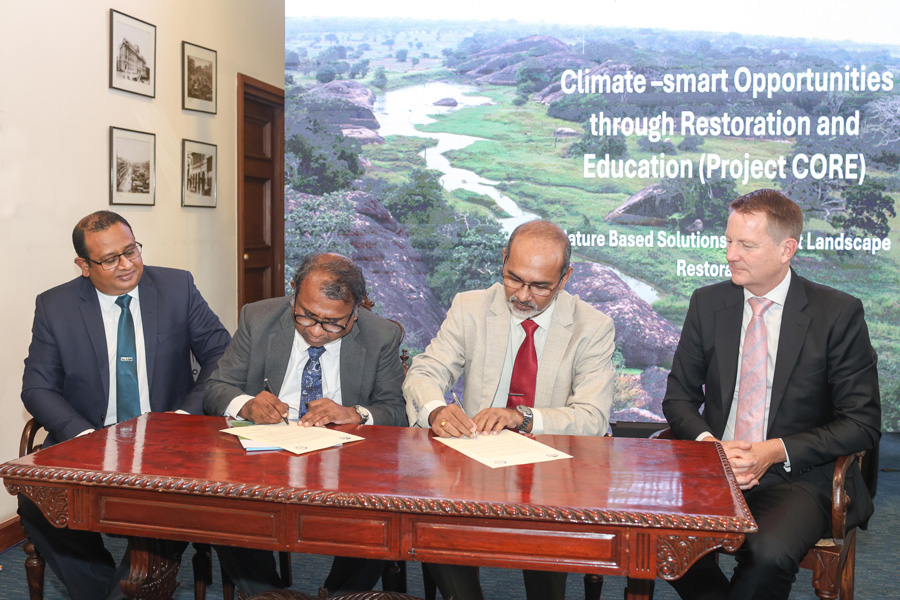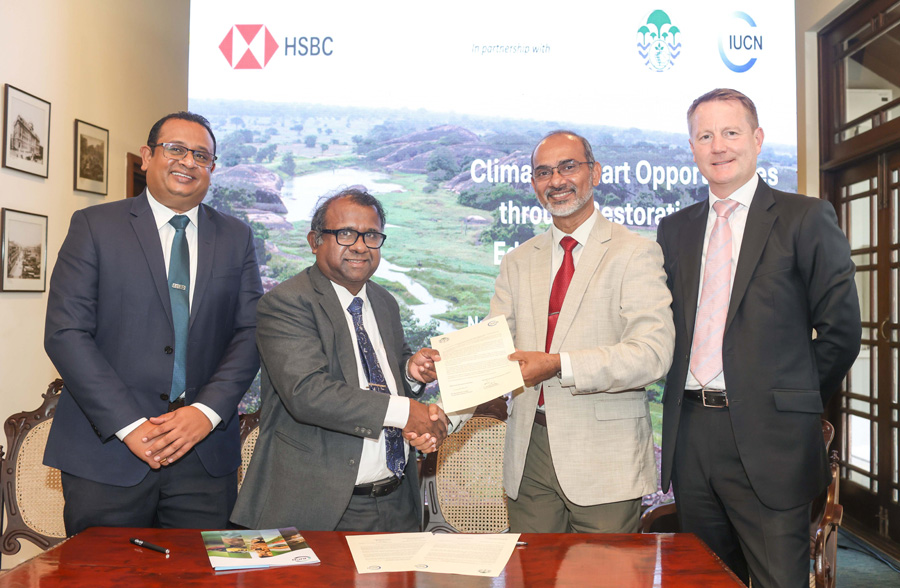The initiative exemplifies an effective Public-Private-People partnership focused on advancing Sri Lanka’s national and global environmental commitments, particularly those under the 30x30 biodiversity targets, which aim to protect 30% of terrestrial and marine ecosystems by 2030.
A remarkable success of the initiative is the initiation of the first step toward gazetting the restored degraded forest, marked by the establishment of boundary posts, laying the groundwork for long-term legal protection and conservation.
This initiative, which emerged as a pilot model of collaborative environmental stewardship through Nature-based Solutions (NbS), is being implemented under Project CORE: Climate-Smart Opportunities through Restoration and Education, led by HSBC Sri Lanka in partnership with the International Union for Conservation of Nature (IUCN) and the Department of Forest Conservation.
Since its launch in 2021, Project CORE has piloted NbS for Forest Landscape Restoration (FLR) interventions across the Kimbulwewa Cascade landscape in Thuppitiyawa GN Division.
These interventions target degraded lands and community areas, aiming to enhance biodiversity, improve community livelihoods, build climate resilience, and sequester carbon in one of the most climate-vulnerable regions in Sri Lanka’s Dry Zone.
At the heart of this initiative was the intensive reforestation of the degraded Siyabalagaswewa Forest, covering approximately 35 hectares of land under the Forest Department.
An additional 100 hectares of adjoining community land is being restored through regenerative agricultural practices such as food forest gardens, silvopastoral systems, live fencing, and avenue plantations.
Moreover, the Mahawilachchiya Divisional Secretariat and the Department of Animal Production and Health have played pivotal roles in these community-based conservation efforts by collaborating closely with the project team.
A significant milestone has been the installation of boundary posts, an initial step toward the legal declaration of the restored Siyabalagaswewa Forest as a Reserved Forest, with technical support from the Forest Department who will initiate the gazetting process, which officially establishes a protected area, in the near future.
This will help ensure long-term protection of the area while aligning with both national and global conservation targets.
Key interventions under Project CORE include:
Establishment of a community-based plant nursery, now managed by the Forest Department with continued community involvement
Development of Food Forest Gardens, benefiting 26 families through diverse fruit tree cultivation and water and soil conservation practices
Implementation of live fencing models, aiding 73 households and contributing to human-elephant conflict mitigation
Promotion of climate-smart dairy systems and backyard poultry through integrated silvopastoral models that support nutrition, income generation, and biodiversity
Support for soil conservation and small agro-enterprises, including fruit plant nurseries and brooding facilities
Establishment of a community-based organisation named 'Diriya Shakthi,' which helped to engage the communities actively in restoration efforts and ensure sustainability beyond the project's duration
Engagement of youth through research and awareness programmes, including the creation of a butterfly garden at Ashoka Vidyalaya, Siyabalagaswewa
This is the first pilot NbS for FLR initiative in Sri Lanka’s Dry Zone aligned with the IUCN Global Standards for Nature-based Solutions to ensure scientific integrity and long-term community ownership.
HSBC Sri Lanka, the funding partner, has gone beyond a financial contribution.
HSBC staff have actively participated in tree planting campaigns, school awareness programmes, and recognition events for community champions, demonstrating a strong model of inclusive and participatory conservation delivering over 2000 volunteer hours.
HSBC Sri Lanka CEO, Mark Surgenor stated,
“The project is one we are delighted to support, showcasing the power of a well-functioning Public-Private-People partnership bringing a nature-based sustainability solution to the dry zone.
More than just restoring the environment, this project has brought valuable knowledge and experiences to enable more suitable yields to be generated without degrading the land.
He added. “Also, our partnership with IUCN has brought broader benefits to the wider local communities which is truly encouraging.
This collaborative effort has brought together our employees, local authorities, and community members to take meaningful actions to our environment.
We are proud to say that our colleagues have contributed over 2,000 volunteer hours since the project began in 2021.
We hope this will inspire others to take similar steps to build education to support climate resilience across the country.”
The Siyabalagaswewa Forest restoration reflects the power of partnerships in action, where community leadership, government stewardship, and private sector commitment converge for long-term ecological and social impact.
As Sri Lanka accelerates its efforts to meet the 30x30 conservation targets within the Kunming-Montreal Global Biodiversity Framework (GBF), Project CORE provides a replicable and scalable model for integrating climate adaptation and biodiversity conservation while addressing societal challenges through collaborative, locally appropriate, innovative solutions.



